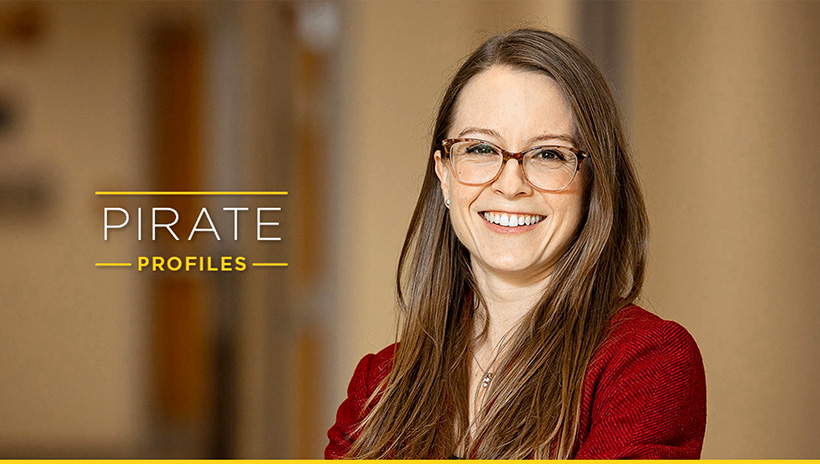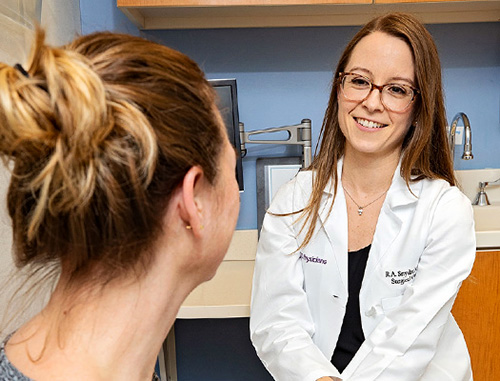Publisher's note: The author of this post, Ken Buday, is a contributor to ECU News Services.
Dr. Rebecca Snyder may be relatively new to Pirate Nation, but East Carolina University's mission to support the rural region in which it is located made coming to ECU an easy choice.
The surgical oncologist in the Brody School of Medicine has been at ECU for just more than a year, arriving in February of 2019. When she's not treating patients and teaching medical residents and students, she's focused on researching the delivery of care to cancer patients.
"Clinical trials evaluate which treatments work the best. Cancer care delivery research is a way to evaluate whether we are actually delivering that care effectively to patients and to determine if there are disparities in how we deliver that care," Snyder said.
"Here at East Carolina, we take care of a predominantly rural population, many of whom face barriers to care such as difficulty with transportation to appointments or limited access to preventative care. My research is focused on trying to understand why these disparities in care exist and how we can reduce or eliminate them."
She said the leadership at the Brody School and within the Department of Surgery provides her the freedom to explore answers to those questions.
Dr. Rebecca A. Snyder speaks with a patient.
"The academic leadership here with Dean (Mark) Stacy, Vice Dean Peter Schmidt, Associate Dean Russ Price and the chair of the Department of Surgery, Betsy Tuttle, has been very supportive of my academic interests and are committed to supporting the type of research that we're doing here," Snyder said.
"It is a wonderful opportunity for me to have that kind of support to be able to ask these important questions that will hopefully make a difference for many cancer patients in our region."
It helped that ECU also recruited her husband, Dr. Alexander Parikh, also a surgical oncologist.
"We both are surgical oncologists who primarily care for patients with pancreas and liver cancers," she said.
"It can be challenging to find an academic institution that has the need and clinical capacity for two surgeons with such a subspecialty niche. Dr. Emmanuel Zervos, now director of the Vidant Cancer Center, worked tirelessly to identify an opportunity for us both, and we are very grateful to be here."
In addition to her own research, Snyder is also a member of the Alliance for Clinical Trials in Oncology, a national cooperative group.
"I'm very involved in cancer clinical trials. Within the past year, I've worked closely with the ECU Clinical Trials Office to open two national randomized trials here that we can now offer to our patients" she said.
"Many patients in the United States, especially those in more rural communities, do not have access to oncology clinical trials. We are committed to making these available to our patients."
Snyder - the mother of a 7-year-old son and 3-year-old daughter - grew up in what she calls "the other Greenville" in South Carolina. Her father, Dr. Bruce Snyder, is a vascular surgeon, so surgery is in her blood.
"I gathered fairly early that my father seemed to be very fulfilled in his profession, and that he really seemed to enjoy his work," she said.
"I also appreciated that I shared some of his personality traits, so I extrapolated that I might enjoy surgery."
She studied molecular biology at Princeton University and then went to Vanderbilt, where she obtained a master's degree in public health and her medical degree, and completed general surgery residency training. She completed a two-year clinical fellowship in complex surgical oncology at the University of Texas MD Anderson Cancer Center where she focused on gastrointestinal cancers, specifically tumors of the liver, bile ducts and pancreas.
"I found myself drawn to surgical oncology during residency because I enjoyed working with patients with cancer," Snyder said.
"Surgical oncology is an opportunity to engage with people who are really committed to getting better, to working with you, to doing anything they can to get through their illness. It's a very collaborative relationship.
"I also appreciate that I am able to take care of patients on all spectrums of the disease, including patients with curable cancers as well as patients with end-stage cancers. Those relationships are very different, but they are also very fulfilling. I get to know my patients and their families over time. They learn to trust me, and I grow as a person by learning about them, not just in terms of their disease, but their lives, their interests, and their personalities."
Surgery also fulfills Snyder on another level.
"I always enjoyed doing things with my hands," she said.
"As a young child, I played piano, and my mother was an artist, so I did a lot of art as a child. I like the tactile, technical aspect of surgery, and I like the immediate feedback of it. You have a problem; you fix the problem. It's very immediately gratifying."
Cancer is also personal for Snyder. Her mother Edwina - despite being a non-smoker - died of lung cancer in 2017 when Snyder was a surgical oncology fellow. Her mother's death helps guide her today.
"I think almost everyone has had a personal experience with cancer in some capacity," Snyder said.
"Whether it's an immediate family member, themselves, a friend, a relative - we've all encountered it in different depths. It was and still is a very hard thing for me because I see my mother in many of my patients. It makes me a better surgeon for sure, but it's an experience I would gladly give up if I could go back in time. Unfortunately, so many of us face this disease, and I'm hoping I can do a small part in helping other people navigate the same situations that my family and I faced."
PIRATE PRIDE
Time at ECU: 14 months
What I do at ECU: "About half of my time is spent taking care of patients, operating and teaching residents and students, and the other half is spent doing research. Most of my research is cancer care delivery research, which is basically a way of saying we look at how effectively and equitably we are delivering treatment to patients. The teaching I do is integrated into my daily work. I teach residents and medical students in the clinic and in the operating room, and I also mentor medical students and residents on research projects."


